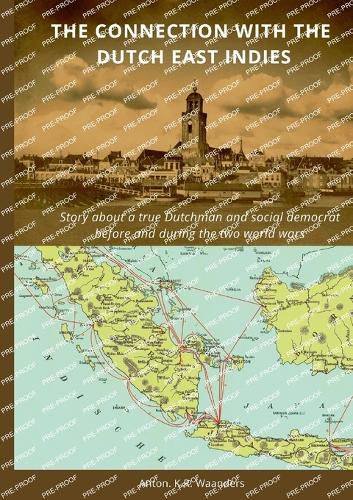Readings Newsletter
Become a Readings Member to make your shopping experience even easier.
Sign in or sign up for free!
You’re not far away from qualifying for FREE standard shipping within Australia
You’ve qualified for FREE standard shipping within Australia
The cart is loading…






This title is printed to order. This book may have been self-published. If so, we cannot guarantee the quality of the content. In the main most books will have gone through the editing process however some may not. We therefore suggest that you be aware of this before ordering this book. If in doubt check either the author or publisher’s details as we are unable to accept any returns unless they are faulty. Please contact us if you have any questions.
A historical biography about an ambitious, hardworking, and socially conscious resident of Deventer. He and his family sought their fortune in the Dutch East Indies, but encountered both happy moments and misfortune and tragedy. After a career in the military where he served in the engineering corps' communication division before and during World War I, Bram Waanders saw an opportunity to work at the Postal, Telegraph, and Telephone Service in the Dutch East Indies. The Dutch government began to see the East Indies as more than just a colony to exploit and invested in telephony and infrastructure. While this was a significant change, significant inequalities persisted between and within the various ethnic groups in the East Indies. Bram also saw inequality within his own profession. He was committed to actively combating this through his involvement in the union, the press, and politics. The crisis of the 1930s worsened the situation, but it also gave him a reason to step up his efforts. The rising ultra-nationalism and fascism in Europe and Asia were of a completely different nature, and threatened the existence and freedom of the colony. The consequences for Bram and his family would be dramatic. Anton Waanders (1970) has been researching his family history since 1997 and has published several genealogical works. With his latest book, he has taken a different path by writing a narrative biography. Using sources from the National Archive, the Royal Library, and family collections, the life of Bram Waanders and his family has been reconstructed. Bram should have been mentioned on the memorial monument for the fallen of the Communication Division, which was unveiled in the 1990s, but he was not. Waanders has successfully rectified this omission by giving a face to his grandfather's forgotten cousin and his East Indies family members in this story.
$9.00 standard shipping within Australia
FREE standard shipping within Australia for orders over $100.00
Express & International shipping calculated at checkout
This title is printed to order. This book may have been self-published. If so, we cannot guarantee the quality of the content. In the main most books will have gone through the editing process however some may not. We therefore suggest that you be aware of this before ordering this book. If in doubt check either the author or publisher’s details as we are unable to accept any returns unless they are faulty. Please contact us if you have any questions.
A historical biography about an ambitious, hardworking, and socially conscious resident of Deventer. He and his family sought their fortune in the Dutch East Indies, but encountered both happy moments and misfortune and tragedy. After a career in the military where he served in the engineering corps' communication division before and during World War I, Bram Waanders saw an opportunity to work at the Postal, Telegraph, and Telephone Service in the Dutch East Indies. The Dutch government began to see the East Indies as more than just a colony to exploit and invested in telephony and infrastructure. While this was a significant change, significant inequalities persisted between and within the various ethnic groups in the East Indies. Bram also saw inequality within his own profession. He was committed to actively combating this through his involvement in the union, the press, and politics. The crisis of the 1930s worsened the situation, but it also gave him a reason to step up his efforts. The rising ultra-nationalism and fascism in Europe and Asia were of a completely different nature, and threatened the existence and freedom of the colony. The consequences for Bram and his family would be dramatic. Anton Waanders (1970) has been researching his family history since 1997 and has published several genealogical works. With his latest book, he has taken a different path by writing a narrative biography. Using sources from the National Archive, the Royal Library, and family collections, the life of Bram Waanders and his family has been reconstructed. Bram should have been mentioned on the memorial monument for the fallen of the Communication Division, which was unveiled in the 1990s, but he was not. Waanders has successfully rectified this omission by giving a face to his grandfather's forgotten cousin and his East Indies family members in this story.